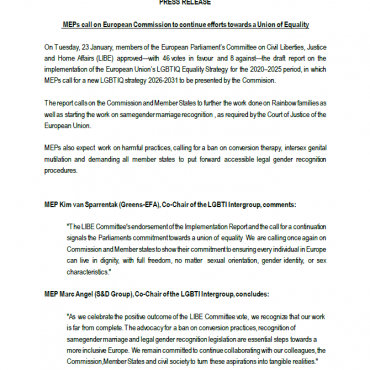Belgrade Pride banned: Members of the European Parliament express deep regret
The Serbian LGBT pride march Parada Ponosa, due to take place on Sunday in the capital, was banned today by the National Security Council. The Council announced it would forbid the pride march, as well as three far-right counter-protests that were planned tomorrow and Sunday.
 Members of the European Parliament and Vincent Degert, Head of the EU Delegation to Serbia, had called earlier for freedom of expression and freedom of assembly to be respected despite threats of violence from several extreme-right groups.
Members of the European Parliament and Vincent Degert, Head of the EU Delegation to Serbia, had called earlier for freedom of expression and freedom of assembly to be respected despite threats of violence from several extreme-right groups.
Organised groups repeatedly threatened large-scale physical violence in and around Belgrade, should the pride go ahead. Last year 150 police officers and members of the public sustained injuries; 250 arrests were made; and authorities acknowledged over 1M€-worth of damages to public property.
Explaining why they banned all planned events, the National Security Council cited the incapacity of police forces to cope with such confrontations. At the time of writing, it is not clear whether organisers will still attempt to go ahead and hold the pride.
Ulrike Lunacek MEP, Co-President of the LGBT Intergroup and substitute member of the South Eastern Europe delegation, reacted: “I deeply regret that Serbian citizens will not be able to march for tolerance, acceptance and equality on Sunday. Serbian authorities have a duty to care for everyone’s safety, but it is profoundly disturbing that the leadership of a country seeking EU candidate status and membership—supported by a majority in the European Parliament—feel incapable of providing such safety for all citizens.”
“The government has to be much, much stricter towards extremists whipping up violence in the country . A society that cannot express itself for fear of violence is not a free, democratic society.”
From Belgrade, Jelko Kacin MEP, European Parliament Rapporteur for Serbia’s accession and member of the LGBT Intergroup, added: “The decision to ban Pride Parade is a sovereign decision of the Serbian Government and the National Security Council. I receive such a decision with deep regret; as a matter of fact, it deprives citizens of the constitutional and legal right to free expression and peaceful assembly. A state seeking to access the EU must guarantee the human rights of its citizens. I have come to Belgrade to give my full support the pride’s organisers.”
In a June 2011 report, Council of Europe Commissioner for Human Rights Thomas Hammarberg had highlighted strong public opposition to LGBT pride events in Serbia. The European Parliament will take note of this weekend’s events in its upcoming accession report for Serbia, planned for early 2012.






